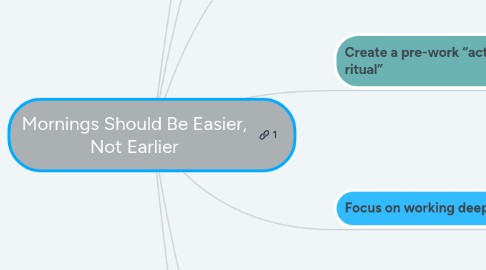
1. Introduction
1.1. It’s not the amount of time you have that matters, but how you spend the time you have.
1.2. Consistent, focused effort is what's important
1.3. If you’re sleep-deprived, disorganized, and irritable, you’re not going to perform at your best.
1.4. Create good routines, and establish systems that clear distractions, prepare our minds, and reinforce habits.
2. Prep for your morning the evening before
2.1. Having to navigate a series of choices first thing in the morning can lead to decision fatigue
2.1.1. It kills your momentum even before you start work
2.2. Radically reduce your morning mental load by prepping the evening before.
3. Get a good night’s sleep
3.1. Be consistent.
3.1.1. Try to go to bed and wake up around the same time each day, even on weekends.
3.2. Don’t get into bed unless you’re actually sleepy.
3.2.1. Getting into bed before you’re truly sleepy is a great way to start worrying.
3.2.1.1. And worry leads to anxiety, which leads to difficulty falling asleep.
3.2.2. Listen to your body and don’t try to force your sleep.
3.3. Establish and maintain a “sleep runway.”
3.3.1. Make relaxation before bed a priority.
3.4. Don’t try too hard to “hack” your sleep routine.
3.4.1. Too much tinkering with your sleep routine can quickly lead to sleep effort and, paradoxically, not being able to sleep well.
4. Create a pre-work “activation ritual”
4.1. Your ritual might be taking three deep breaths, focusing on a set image, or listening to a particular song
4.2. What matters is that it’s consistent.
5. Focus on working deeply
5.1. “Deep work” is how author Cal Newport describes the kind of work that ruthlessly prioritizes quality over quantity.
5.2. Know the day before exactly what you’ll be working on during your deep work hour.
5.2.1. Take an index card and jot down three things you want to accomplish the next day and leave it on your desk.
5.3. Put your phone somewhere out of sight and earshot while you’re doing deep work.
5.4. Build up to working for an hour straight.
5.4.1. Start by doing 20 minutes of deep work, and slowly increase it to an hour
6. Use the “Seinfeld strategy” to track your work
6.1. When we keep track of our goals and progress, we are naturally motivated to continue and improve.
6.2. Use the “Seinfeld strategy”
6.2.1. Buy yourself a plain monthly wall calendar.
6.2.2. At the top of the calendar note the task or action you’re tracking.
6.2.3. After you’ve completed the task, put a big X or some kind of mark through that day.
6.2.4. Try to go as many days as possible without breaking the streak.
6.2.5. If you do miss a day, note how many days there were in your streak and set that, plus one more, as your new goal.
6.3. There’s something extremely motivating about imagining how ugly it’s going to look if all but one day is filled in.
6.4. Once you’ve done this for several months, looking back over all your tracked work can motivate you to keep going.
7. Reward yourself for having a productive morning
7.1. Are you consistently having trouble getting good work done in the morning?
7.1.1. It’s likely because other behaviors and routines are more rewarding, and therefore more strongly reinforced.
